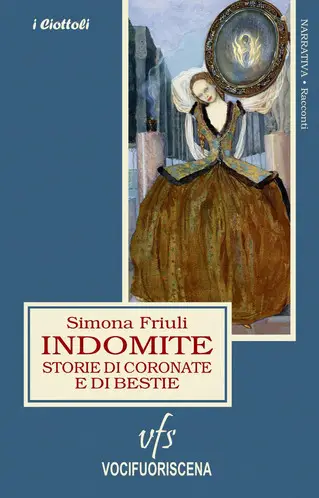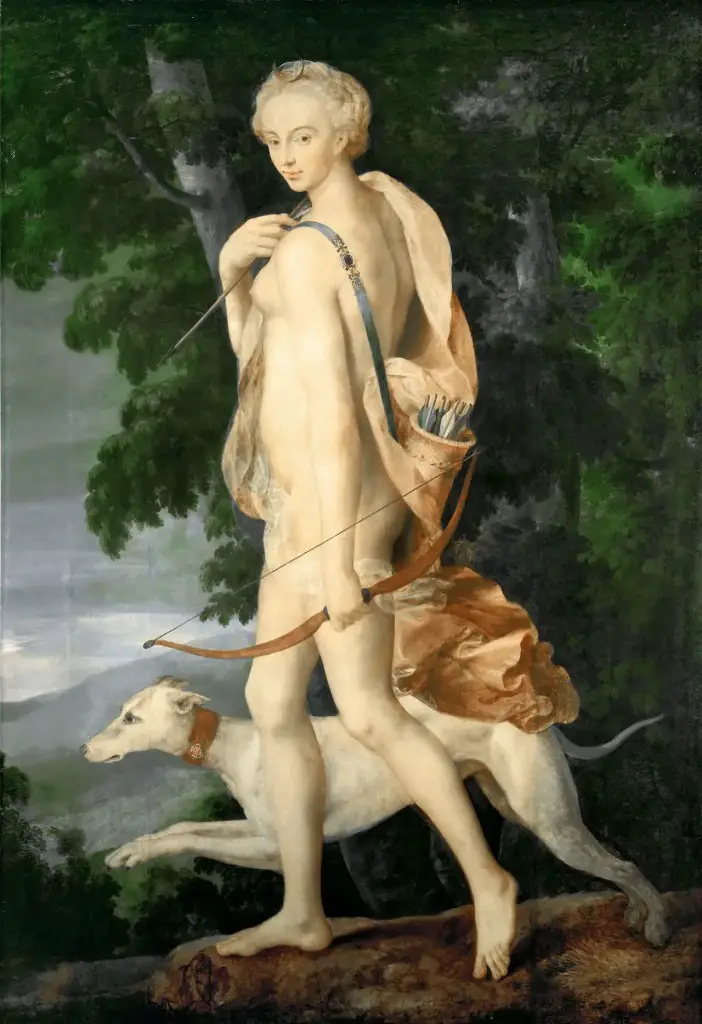In the collection "Indomitable. Stories of crowned and beasts ", published by Vocifuoriscena, there is an echo of the best Sylvia Townsend Warner, among forests, hunter goddesses, bacchantes, kings and queens. A contemporary update of witch literature halfway between the "cruel tale" and the "black fairy tale".
di Paul Mathlouthi
"... women I brought with me from foreign lands,
Euripides
My accomplices and fellow travelers ".
In a famous interview given in 1977 to Alberto Arbasino who, out of a spirit of contradiction, pressed him on the theme of realism, the hypnotic mantra of what was then called militant culture, Jorge Luis Borges he replied lapidary that literature is either fantastic or it simply isn't.
“Realism - specified - it's just an episode. No writer has ever dreamed of being their own contemporary. Literature originated with cosmogony, with mythology, with tales of gods and monsters ”.
The infamous idea, now so much in vogue, that writing serves to monitor reality, with its contradictions and its ephemeral upheavals is a distortion, a demonia inherent in the modern world, a disease of the soul that in recent years has allowed female writers pubescent improvisations to entertain crowds of readers, describing their sexual adventures with morbid meticulousness between brush strokes. Fortunately, there are still those who, at the dawn of the XNUMXst century, demonstrate that they are moving with proud awareness in an obstinate and opposite direction, embracing the lesson of the great Argentine. It is the case, all the more precious because it is rare, of Simon Friuli is for the newly founded Viterbo publishing house Vocifuoriscena, particularly sensitive to the different forms through which the Fantastic is incarnated in the word, he fired a dazzling collection of witchcraft tales entitled Indomitable.
A pupil of Calliope, the young writer knows that it is the Muse who opens the Poet's third eye and feeds the sacred fire of inspiration. Writing is a human practice that has a very close correlation with the divine, it is the reverberation of the infinite on the finite as Kant would have said, the only way allowed to mortals to glimpse God (or the Devil, who is the shadow side of the same ). To erect cathedrals of light to illuminate the darkness, to sow the seed of dragons, to cast their arches beyond the world of dreams according to the admonition of Ernst Junger: this seems to be the task full of omens that the Author intends to assign to the perilous exercise of writing. Opposing the shadowy illusions of becoming the granite perenniality of the archetype, draw on the roots of the Myth to ensure that the Eternal Return can be fulfilled again, in spite of time and its changing forms.

And it is precisely about archetypes (don't mind the good Sigmund Freud) that in these feral, ruthless stories "of crowned and beasts" we discuss with learned, sought-after awareness, willingly indulging in a legitimate, amused self-satisfaction. At the center of the plot, a Forest: a dangerous, primordial place, a sacred space par excellence dedicated to the encounter between man and the supernatural, impregnable recess where "not even the stars dare to shed light" that inextricably rises to perennial testimony of what, improvised and wicked, we have lost together with the childhood of the world.
Banished from heaven, one Goddess huntress he finds his abode in the form of a Woman. It almost seems to see her, the Poisonous, slender and statuary moving in the thick of the bush, fully at ease with her in that leafy, reassuring darkness that offers her accomplice shelter from the arrows of her jealous paternal power. She is austere and erect in her posture, slender, sinuous and lethal as a young panther darting through the branches in pursuit of panting prey, shooting an arrow to make the wind bleed.
Other figures surround her, consecrated to her by the secret and indissoluble bond of a deep, carnal consanguinity, the same that unites the affiliates to a coven of bacchantes: the Rossa, the Mezzana, the Buia, the Fredda, the Spinosa. Different names for as many experiences of broken slavery, atavistic, indelible stigma of an imperious, frenzied, prophetic femininity, "not tamable by petting or caressing" and irreducible to the constraints of a Pharisaic Law, the repressive one inherent in the exercise of Power, a specific attribute of the male world which, perched in a haughty defense of its social prerogatives, would like these hungry and furious Erinyes necessarily mothers, daughters, wives or, at best, , concubines.

In the wake of the Goddess they rediscover instead a lost familiarity with the animal world, their skin is dressed in bark, garlanded with ivy, they are reborn to new life in the sign of a panic symbiosis with the Forest, they learn to listen to the voice of the beast that has been living in them for too long constrained in chains, they take on the traits that the moonlight reveals to the gaze of the unwary in all its desperate terribleness. Each
“In things he grew up in the woods, carrying bunches of blackberries and brambles on his chest. He had ears to hear the beasts, if they approached, and the fall of the fruit, or of man's footsteps - sinister animal, more than any other -, crackling the leaves. He didn't have a mouth made of human words, but with that he howled or yelped according to his need for him. He learned from the fairs, because he was part of them. She was not human except for the body which also adhered to the wild life: her limbs stretched, elongating her torso, and, strong, her teeth grew in her mouth and all browned with mud: with that she imitated hairy beasts. When the earth was no longer enough for her, she learned to remove the fleece from death, and to cover herself with it, belonging to the forest more. She wore no coiffed hair, nor gold on them as she would have been entitled to. To dress her was the forest: the wind adorned her cheeks with leaves and in her hair - tangle she sowed feathers or small fruit, depending on where she lay; and she did not carry herself upright, crawling on all fours. This is why she was dear to Velenosa: summed up she had the milk of the grass and, in what was not a language, she solemnly swore herself, dissolved like a Storm to live powerful. "
[1]
They transmute the sylvan adepts of the numinous sovereign and, depending on the nature of their lot, they become wolves, tigers, foxes, pythonesses, arachnids, savoring the bloody, irrepressible, spasmodic frenzy of the hunt. They suddenly reveal themselves in their authentic nature in front of men who, ensnared by the call of the senses, unwittingly try to override them and, as implacable as praying mantises, devour their limbs.
“Because the Goddess has the eyes of the basilisk, and she changes into a snake - blue-silver sinuosity; anthrax of scales. Creeping body to human body enveloping, she tears him apart. […] Because the antimony-colored Serpentess has bent her head, and deflowering his neck with her teeth, clenching it against herself, she bites while blood smoothes her forked tongue, and at that filthy, poison, veins and flesh […]. She stops breathing as the Poisonous withdraws and, appeased, dying watches him. The Forest takes his heart, making it into dust. "
[2]

The encounter with divinity, especially if it is wild, is clearly not suitable for the indolent and cowardly, since it is never without consequences and always requires a pledge. In the consummate elegance with which Simona Friuli demonstrates that she knows how to handle a dangerous matter such as that of the imagination, I am pleased to glimpse, perhaps sinning a little presumption (I hope not to attract the thunderbolts of the Author), an echo of the best Sylvia Townsend Warner, That of Lolly willowes to be clear, where the unsuspecting protagonist embarks on an initiatory path of progressive self-awareness that will lead her to celebrate an arcane wedding with none other than the Prince of Darkness himself (the latter book, ça va sans dire, highly recommended).
Like the illustrious English forerunner, unsurpassed teacher of cruel tale so much so as to deserve a certificate of esteem from Theodore Francis Powys, a merciless critic because he is damned aware of his talent and therefore not at all accustomed to pouring out free compliments to anyone who was not himself, the choice of tale as habitus the formal narrative, embellished with a studiedly obsolete language and interwoven with precious baroque archaisms, does not want to be a simple exercise of style, which certainly does not lack it, but also in this case conceals a precise poetic intent. Accepting reality with its narrow spaces would mean for the talented Dryad aspiring to admit the finitude of the human condition, abdicate the belief that the ultimate reasons for existence reside in a superior design, renounce the search for meaning, a glimmer of Truth beyond appearances.
In this perspective, the "Escape" to the Elsewhere that his prose offers us is not an act of desertion, but rather resembles the prisoner escape evoked by Tolkien at the time: breaking the chains of contingency to regain the lost proximity to the Origin, to regain our place in Being. If, as fools claim, the world changes continuously, the Epos is always the same, because it speaks the language of Eternity.
Footnotes
[1] Simona Friuli, Indomild. Stories of crowned and beasts, Vocifuoriscena, Viterbo, 2020; page 47- 48
[2] Ibidem; page 56
